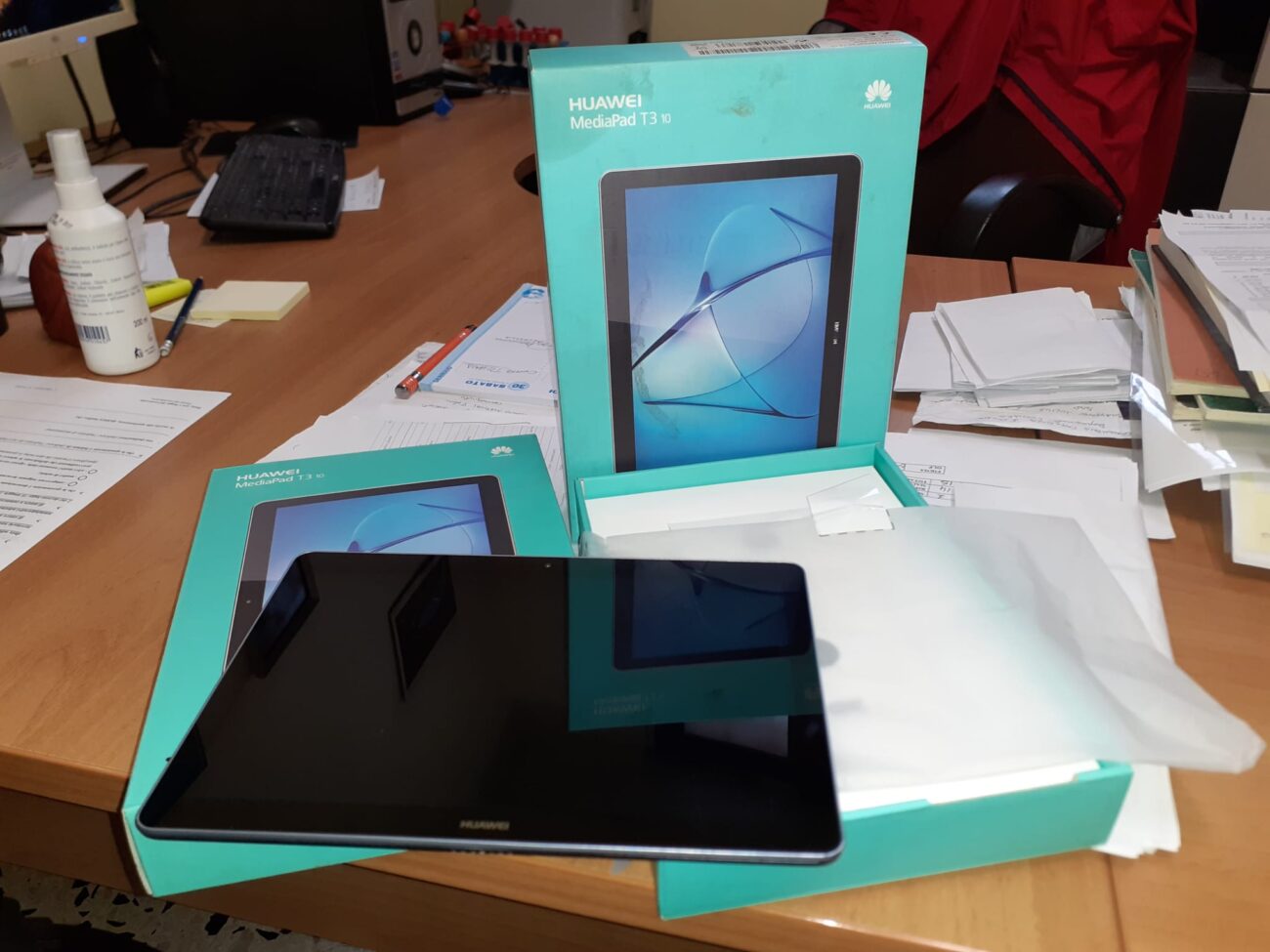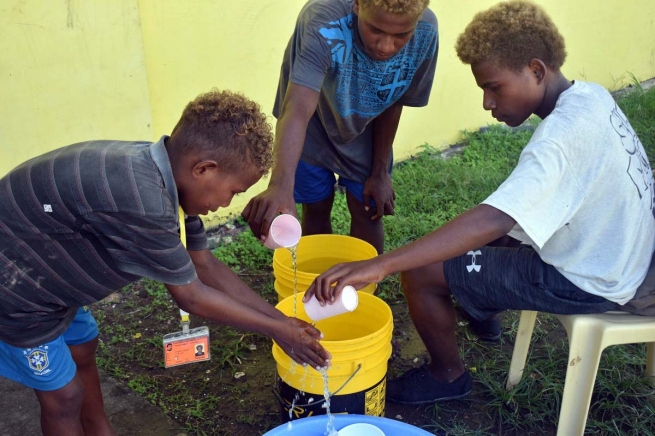INTERNATIONAL LITERACY DAY: Salesian programs meet challenges to educate youth

Salesian Missions highlights educational initiatives that ensured youth continued their education during the pandemic
(MissionNewswire) Salesian Missions, the U.S. development arm of the Salesians of Don Bosco, joins humanitarian organizations and countries around the globe in celebrating International Literacy Day. Celebrated each year on Sept. 8, the day was launched in 1967 to “remind the public of the importance of literacy as a matter of dignity and human rights and to advance the literacy agenda towards a more literate and sustainable society.”
This year’s theme focuses on “Literacy for a human-centered recovery: Narrowing the digital divide” and highlights the challenges faced around the globe with providing literacy education during the pandemic.
UNESCO (The United Nations Educational, Scientific and Cultural Organization) has noted, “The COVID-19 crisis has disrupted the learning of children, young people and adults at an unprecedented scale. It has also magnified the pre-existing inequalities in access to meaningful literacy learning opportunities, disproportionally affecting 773 million non-literate young people and adults. Youth and adult literacy were absent in many initial national response plans, while numerous literacy programs have been forced to halt their usual modes of operation.”
UNESCO stressed the importance of finding alternative ways to ensure continuity in learning, including distance learning. The organization further stated, “The rapid shift to distance learning also highlighted the persistent digital divide in terms of connectivity, infrastructure, and the ability to engage with technology, as well as disparities in other services such as access to electricity, which has limited learning options.”
“Salesian missionaries focus educational efforts on literacy and an array of other foundational skill building initiatives, including learning English language skills,” said Father Gus Baek, director of Salesian Missions. “During the pandemic, Salesians have been working to address educational challenges head-on with many changing and adapting to provide educational lessons remotely and in person with safety measures in place. They are also working to ensure youth in their programs have access to the technology to do their work remotely.”
In honor and celebration of International Literacy Day 2021, Salesian Missions is proud to highlight Salesian programs with a focus on literacy that give poor youth a chance to gain an education, especially during the pandemic.
ECUADOR

The campaign “Donate your computer” launched to provide technology tools to vulnerable populations in 12 cities across Ecuador.
The Salesian Province of Ecuador, in collaboration with Don Bosco Mission and Salesian Polytechnic University, launched the campaign “Donate your computer” to provide technology tools to vulnerable populations in 12 cities across the country. This campaign is looking for a broad range of technology including tablets, laptops, PCs, keyboards, mice, screens, speakers and electrical cables.
The initial goal of the campaign was to provide 500 technological tools so that children and older youth could attend virtual lessons, continue to digitally meet their classmates, do their homework and maintain hope for a better world through education.
Father Francisco Sánchez, Salesian provincial of Ecuador, said, “Today, we want to take a step forward and present this new campaign, a solidarity initiative under the slogan ‘No one excluded,’ to ensure that vulnerable children, adolescents and young people can study under the same conditions as those that have a connection.”
INDIA

The goal of the Digital Wings initiative in Chennai, India, is to provide laptops to female students to help them stay in school during the pandemic.
Graduates from the 1997 class of Don Bosco Egmore have rallied together to launch the Min Siragugal (Digital Wings) initiative to provide laptops to female students to help ensure that they aren’t forced to drop out of school during the pandemic. The goal is to provide 50 laptops to poor students from two Adi Dravidar Welfare Schools on the outskirts of Chennai, India.
One of the graduates, Deepu Antony, noted that while many are donating to provide support to medical facilities during the second wave of the virus, Antony and his classmates wanted to donate to a cause that many aren’t talking about—ensuring access to education for girls. Antony said, “We thought that we should do something that would benefit more people and support unaddressed needs that could have settled to the bottom unnoticed.”
Antony added, “There are multiple reports from India and beyond, including reports prepared by the United Nations about children dropping out of the school system due to economic pressure brought on by the pandemic. In India, the girl child is at a greater disadvantage in this situation.”
ITALY

Students from Santa Chiarra in Palermo, Italy, had access to school supplies, including tablets for online learning, thanks to donor funding from Salesian Missions.
Forty students attending the Salesian oratory in the community of Santa Chiarra in Palermo, Italy, had access to school supplies, including tablets for online learning as well as pens, pencils and notebooks, thanks to donor funding from Salesian Missions. The funding also covered the costs for sanitizing gels, a machine to sanitize rooms and food for the families of the children at the oratory.
Most of the children attending the oratory are ages 6-15 and come from families that are low income. Most of their parents are unemployed or illegally employed, and some of the children’s fathers are in jail or under house arrest. Twelve families were supported through this initiative.
Giuseppe, who is 9, was one of the students supported. He lives in a small home with his parents who do odd jobs to make a meager income. When his family tested positive for COVID-19, he had to remain home in quarantine for 20 days and missed school. Salesian missionaries were able to provide him with a tablet so he could continue with his schoolwork during this time. He was able to connect with online lessons and not miss any days of school or fall behind his peers.
SOLOMON ISLANDS

In Honiara, Solomon Islands, children living near the Ranadi dump site are able to receive an education instead of working in the dump.
Don Bosco Technical Institute Henderson, located in Honiara, the capital city of the Solomon Islands, launched a project in 2019 to provide education to children living near the Ranadi dump site in a suburb east of Honiara. The families who live there experience high rates of poverty, unemployment and illiteracy. Most spend their days at the dump collecting materials that can be recycled.
Children often work with their parents, which prevents them from regularly attending school and receiving an adequate education. Due to the unsanitary conditions of the dump, the hygiene of these children and their families is precarious and negatively impacts their health.
Don Bosco Technical Institute Henderson launched a literacy center that serves children who are too poor to attend even a government school. Since March 2019, Salesian missionaries have been teaching children, between the ages of 4-13, to read, write and refine their calculation skills. There is also a Salesian course to raise awareness among parents so that they understand the importance of giving their children a proper education and are motivated to send them to school instead of working in landfills.
###
Sources:
ANS Photo (usage permissions and guidelines must be requested from ANS)
INDIA: Education for girls focus of laptop initiative
ANS Photo (usage permissions and guidelines must be requested from ANS)
ITALY: Students keep up with online learning through tablets, support from donor funding
Photo courtesy of Salesian Missions (contact for usage permissions)
International Literacy Day 2021
SOLOMON ISLANDS: Literacy center serves children who live at dump site, too poor to attend school
ANS Photo (usage permissions and guidelines must be requested from ANS)




